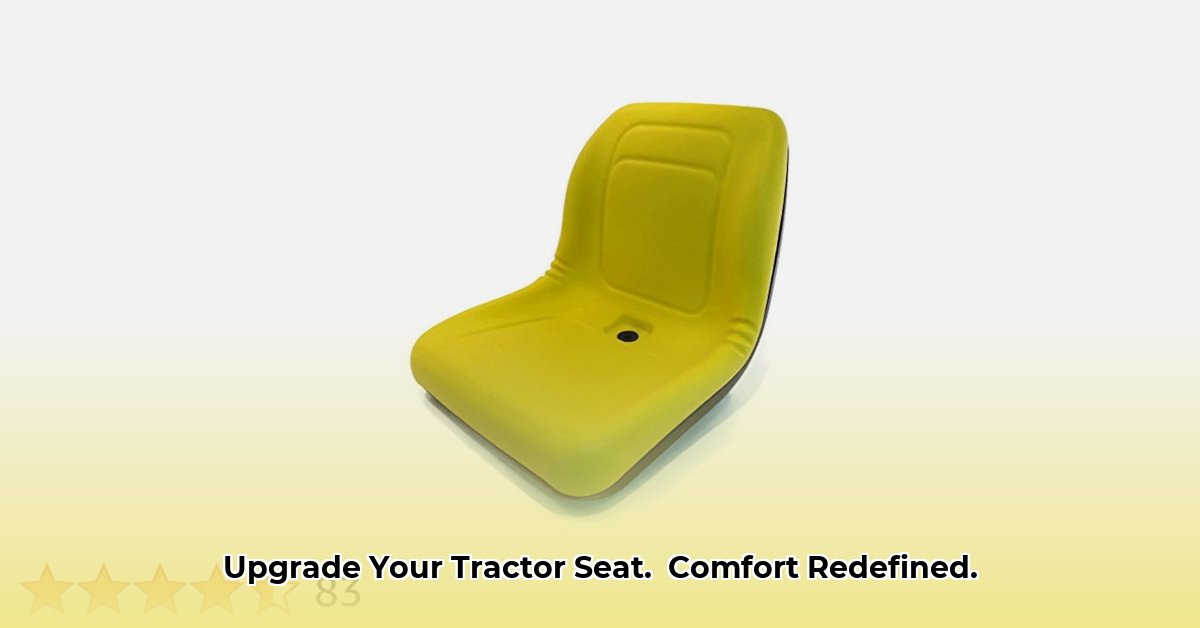
John Deere Replacement Tractor Seats: Comfort, Longevity, and Sustainability
Long hours spent on a tractor demand a comfortable and reliable seat. A worn-out seat compromises productivity and operator well-being. This article explores John Deere replacement tractor seats, emphasizing comfort, longevity, and environmental responsibility. We'll examine the advantages of OEM parts, discuss sustainability concerns, and provide actionable recommendations for farmers, John Deere, and governmental agencies. For more on advanced seating options, check out this resource on air ride seats.
The Case for Original John Deere Seats
While cheaper alternatives exist, genuine John Deere seats offer significant benefits:
Perfect Fit: Original equipment manufacturer (OEM) seats are precisely designed for your tractor model, ensuring optimal comfort and eliminating pressure points.
Superior Performance: John Deere seats utilize high-quality materials and rigorous testing, promising reliable performance and extended lifespan compared to non-OEM options.
Warranty Protection: Genuine parts come with warranties, safeguarding against defects and providing peace of mind.
Long-Term Cost Savings: Although the initial investment might be higher, the extended lifespan of an OEM seat often translates to significant long-term cost savings compared to frequent replacements of inferior seats. This reduces overall operational expenses.
Sustainability: A Seat's Environmental Footprint
The entire lifecycle of a tractor seat—from manufacturing to disposal—impacts the environment. Currently, data transparency regarding the environmental footprint of John Deere seat manufacturing is limited. More information is needed on the materials used and the manufacturing process to facilitate informed consumer choices. What percentage of the seat is recyclable? What is the carbon footprint of its production? These questions urgently require answers.
Actionable Recommendations for Stakeholders
To enhance the sustainability of replacement tractor seats, a collaborative effort is crucial:
For John Deere:
- Transparency: Publicly disclose materials used and the environmental impact of seat manufacturing processes. This detailed information will empower consumers to make informed, eco-conscious decisions.
- Sustainable Materials: Invest in research and development of eco-friendly seat materials, such as recycled plastics or bio-based alternatives. This reduces reliance on virgin resources and lowers the carbon footprint.
- Lifecycle Assessment: Conduct a comprehensive lifecycle assessment (LCA) to identify areas for improvement and minimize the overall environmental impact of seat production and disposal.
For Farmers:
- Lifecycle Cost Analysis: Consider the complete lifecycle cost—initial purchase price plus long-term maintenance and replacement costs—when selecting a seat. A more expensive, durable seat can offer substantial long-term savings and reduce waste.
- Sustainable Sourcing: Support manufacturers committed to sustainable practices by actively searching for and selecting environmentally responsible products.
- Extended Warranties: Explore extended warranty options to maximize seat lifespan and reduce the frequency of replacements.
For Governmental Agencies:
- Incentivize Sustainability: Implement policies and financial incentives to encourage manufacturers to adopt sustainable practices in agricultural equipment production.
- Research Funding: Allocate resources to research sustainable materials and manufacturing processes for agricultural machinery, fostering innovation in cleaner production methods.
- Responsible Disposal Regulations: Establish regulations to promote responsible disposal and recycling of agricultural equipment components, reducing landfill waste and promoting a circular economy.
Risk Assessment Matrix
Understanding the potential risks associated with tractor seat replacement is crucial:
| Risk Factor | Probability | Impact | Mitigation Strategy |
|---|---|---|---|
| OEM part failure | Low | Moderate | Purchase from authorized dealers; verify warranty coverage. |
| Non-OEM part incompatibility | Medium | High | Thoroughly research compatibility before purchasing. |
| Unsustainable manufacturing | Medium | High | Choose manufacturers with transparent sustainability policies. |
| Excessive Packaging Waste | High | Low | Opt for minimal and recyclable packaging. |
| Difficult Recycling/Disposal | Medium | Low | Support manufacturers with recycling or take-back programs. |
Conclusion: A Comfortable and Sustainable Future
Choosing a replacement tractor seat requires a thoughtful approach balancing comfort, longevity, and environmental considerations. By working collaboratively, farmers, manufacturers like John Deere, and governmental agencies can foster a more sustainable and comfortable future for agriculture. Demand transparency, support eco-conscious practices, and actively contribute to a greener future in farming.